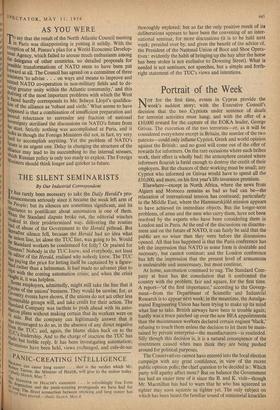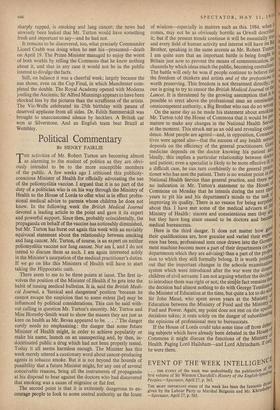Portrait of the Week
Not' for the first time, events in Cyprus provide the week's saddest story; with the Executive Council's decision that the two Cypriots under sentence of death for terrorist activities must hang; and with the offer of a £10,000 reward for the capture of the EOKA leader, George Grivas. The execution of the two terrorists—or, as it will be considered everywhere except in Britain, the murder of the two patriots—could only inflame Cypriot, Greek and world opinion against the British : and no good will come out of the offer of rewards for informers. On the rare occasions where such bribes work, their effect is wholly bad; the atmosphere created where informers flourish is foetid enough to destroy the credit of their employers. But the chances of their working must be small; any Cypriot who informed on Grivas would have to spend all the £10,000, and more, on his first year's life insurance premium.
Elsewhere—except in North Africa, where the news from Algiers and Morocco remains as bad as bad can be—the relaxation of international tension has continued; particularly in the Middle East, where the Hammarskjold.mission appears to have achieved its immediate objects. But the longer-term problems, of arms and the men who carry them, have not been resolved by the experts who have been considering them in London and in Paris. At the end of the discussions on disarma- ment and on the future of NATO, it can fairly be said that the public are no wiser than they were before the discussions opened. All that has happened is that the Paris conference has left the impression that NATO in some form is desirable and necessary, but cannot continue; and the London conference has left the, impression that the present level of armaments is undesirable and unnecessary, but must continue.
At home, automation continued to nag. The Standard Com- pany at least has the consolation that it confronted the country with the problem, fair and square, for the first time. A report—'of the first importance,' according to the Goverr ment—from the Department of Scientific and Industnal Research is to appear next week; in the meantime, the Amalga- mated Engineering Union has been trying to make up its mind what line to take. British airways have been in trouble again; hardly was a truce patched up over the new BEA appointments than the maintenance workers declared certain engines 'black,' refusing to touch them unless the decision to let them be main- tained by private enterprise—the manufacturers—is rescinded. Silly though this decision is, it is a natural consequence of the resentment caused when men think they are being pushed around for political purposes.
The Conservatives cannot have entered into the local election campaign with any great confidence, in view of the recent public opinion polls; the chief question to be decided is : Which party will apathy affect most? But on balance the Government has had an easier time of it since the B. and K. visit—though Mr. Macmillan has had to warn that he who has squeezed us tighter may soon squeeze us tighter yet. The only subject on which has been heard the familiar sound of ministerial knuckles sharply rapped, is smoking and lung cancer; the news had unwisely been leaked that Mr. Turton would have something fresh and important to say—and he had not.
It remains to be discovered, too, what precisely Commander Lionel Crabb was doing when he met his—presumed—death on April 19. The Prime Minister managed to enjoy the worst of both worlds by telling the Commons that he knew nothing about it, and that in any case it would not be in the public interest to divulge the facts.
Still, on balance it was a cheerful week; largely because the sun shone, even on the Cup Final, in which Manchester com- pleted the double. The Royal Academy opened with Moderns jostling the Ancients; Sir Alfred Munnings appears to have been shocked less by the pictures than the scruffiness of the artists. The Vic-Wells celebrated its 25th birthday with paeans of deserved applause from all sides. Dr. Edith Summerskill was brought to unaccustomed silence by hecklers. A British car won at Silverstone. And an English team beat Brazil at Wembley.



































 Previous page
Previous page